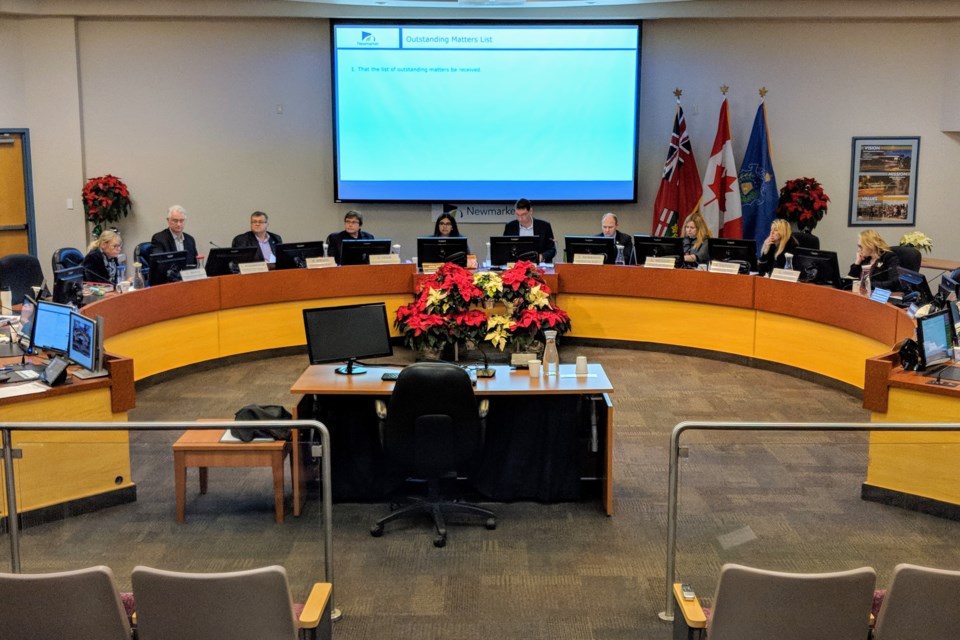There were no surprises Monday night as Newmarket Council put its stamp of approval on the 2020 budget.
“We have achieved so many goals in this budget,” Mayor John Taylor said. “First of all, we set a direction that we wanted it to not exceed a 3 per cent (tax increase).”
Effective Jan. 1, 2020, local taxpayers will see an all-in tax increase of 2.39 per cent, which accounts for the town, York Region and school board portion, the last two parts of which are subject to tax shifting and finalized tax rates.
Based on an average property assessment value of $618,750, residents will see an increase of $59.74 on their tax bill, a water/wastewater rate increase of $59.72 (4.92 per cent) and a stormwater rate increase of $4.12 (10.86 per cent).
The town’s total 2020 operating budget is $134.6 million, and the capital budget is $37.8 million, for a total of $172.4 million.
Taylor noted a municipality collects about 10 per cent of all tax dollars in Canada, yet municipalities Canada-wide are responsible for about 60 per cent of all infrastructure in the country.
“This can put enormous pressure on a municipal budgeting process,” he said. “But a practice that we want to continue is to have no deferral of costs to future years to balance the budget. We’re not getting the percentage tax increase down by pushing the costs off to next year or years after, that’s not occurring.”
Any savings the town finds through its REV it up exercise, geared to finding efficiencies and new ways of doing things with a review of its administrative and service delivery, will be applied to next year’s budget.
Newmarket was one of 39 municipalities to receive a grant from the Ontario government to conduct the review.
“Newmarket continues to have below average tax levies when compared with our neighbours throughout the GTA,” Taylor said. "In fact, the recently released BMA (Management Consulting) study indicates Newmarket’s levy is 10.9 per cent below the GTA average. We are confident that this budget will continue to provide the high quality services that our residents appreciate, while balancing the future needs of our next generation.”
The 2019 BMA Study found that Newmarket’s property taxes are 10.9 per cent lower than the GTA average. Each year, BMA Management Consulting completes a detailed municipal comparative study with all communities in the GTA and beyond as part of a comprehensive evaluation of a municipality’s financial condition.
“Being just below average, or 10 per cent below average, is a solid metric for us to target and aim for and I think we’ve achieved that once again and have improved on it,” he said.
“You don’t want to be the highest taxed because that probably means you’re not sharpening your pencils enough and you’re not looking for savings and efficiencies,” said Taylor. “If you’re the lowest taxed, there’s a good chance you’re not investing in your community to make sure all the amenities people want are there, and that we have a strong local economy”.
The town will also explore in 2020 new funding sources for the Mulock property park development, and try to find ways to meet the demands of the new facility while limiting its impact on the taxpayer, he said.
Here are some highlights from the 2020 budget:
- $2.4 million for trails and active transportation;
- $2.2 million for the continued implementation of the Recreation Playbook, including a new skate park design and splash pad construction;
- $1.3 million for new park developments;
- $5.4 million for the design and construction of CYFS Station 4-5;
- $6.6 million for road rehabilitation;
- $1.6 million for fleet replacement;
- $1 million for road resurfacing;
- $623,000 for theatre renovations;
- $300,000 toward the Mulock Farm park/property.
The Town states it is continuing to take a responsible and sustainable approach to asset management, with 1 per cent of its portion of the tax increase, or $600,000, for annual contributions to the tax supported Asset Replacement Fund (ARF).
The ARF was created in 1998 to ensure appropriate funding is available to replace and repair the town’s $1 billion (replacement cost) worth of capital assets, both now and into the future.
For more information about the 2020 Budget, visit here.
